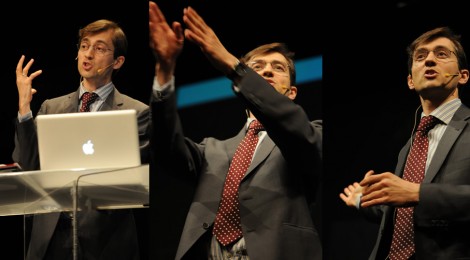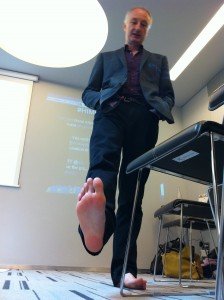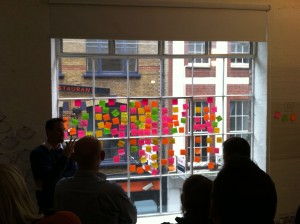
Serious Fun at Hyper Island
Last year I was lucky enough to be invited to an event known as “El Día C” organized by the Club de Creativos, where I met some amazing people, such as the director of Buried Rodrigo Cortés and Kike García and Xavi Puig, the editors of the Spanish version of The Onion, El Mundo Today.
No less amazing was the talk by Christina Peyton of Hyper Island, a Swedish digital marketing and communication school with offices in Manchester, New York and Singapur, who spoke about their methodology in these terms:
At Hyper Island there are no teachers, textbooks, classes or exams. Students learn by working on real projects with real clients, in teams.
Christina told us that 92% of HI students are offered jobs before graduating, and later I learned that Fastcompany included Hyper Island in a list of the top 10 schools of the startup economy.
What really caught my attention, though, was the element of playfulness at the core of their philosophy, and which is more than evident in their many online videos:
At Hyper Island they really get the idea that teamwork, creative work, ANY kind of work really, just delivers better results in a positive emotional environment, where play is allowed and valued as an agent of stress-reduction, motivation and inspiration. And they know how to put this philosophy into practice.
I loved what I saw, so I spoke to Christina, who put me in contact with Amy Rae, Global Creative Director for their Executive Programs –mainly three-day intensive Master Classes which Hyper Island organizes all around the world. Amy was most tickled by my work at Serious Fun, so she invited me to an initial Master Class in París.
The Hyper Island Master Class
I’ll start off by saying I was blown away by everything at the Master Class: the knowledge and communication skills of the speakers and facilitators; the high level of the participants (mainly CEO’s and top managers of European marketing/communication companies, as well as some major brand managers); and last, but certainly not least, by the quality and frequency of pastries (as part of “Fika”, a wonderful Swedish tradition) that helped keep our morale high as a kite over the course of the high-intensity, three-day training session.
On the first day, facilitator Sarah Gregersen (trained as a Kaos Pilot) greeted us with Swedish lollipops and music, and then asked each participant to share with the group his or her “stinky fish” about new technologies (you know, those fears, doubts and prejudices we all have about Twitter, smartphones, and so on). That’s how we discovered that even the CEO’s of companies that sell digital communication services are scared to death of the social networking revolution, are more than a little skeptical about Twitter, hate Facebook…
 Next up was Mark Comerford, an Irish tough guy who’s worked in shipyards and as a driver of the Stockholm underground system, and who now works as a digital journalist and a consultant for political activists in Africa. Mark has experienced the power of social networks as few have: he was in Tahir Square during the Arab Spring, organizing the ambulance service with mobile phones, GPS and motorcycles. He’s received the odd bullet for his efforts, so he’s not intimidated by job titles or executive egos. When he got on stage, he took his shoes and socks off to “get more comfortable” and then started beating us over the head with an incisive sociological analysis, full of shipyard cuss words, of the current moment our civilization is undergoing, destroying more than a few myths about the digital economy along the way:
Next up was Mark Comerford, an Irish tough guy who’s worked in shipyards and as a driver of the Stockholm underground system, and who now works as a digital journalist and a consultant for political activists in Africa. Mark has experienced the power of social networks as few have: he was in Tahir Square during the Arab Spring, organizing the ambulance service with mobile phones, GPS and motorcycles. He’s received the odd bullet for his efforts, so he’s not intimidated by job titles or executive egos. When he got on stage, he took his shoes and socks off to “get more comfortable” and then started beating us over the head with an incisive sociological analysis, full of shipyard cuss words, of the current moment our civilization is undergoing, destroying more than a few myths about the digital economy along the way:
Forget the digital economy, digital strategy… the word ‘digital’ confuses things more than it clears them up. Replace it with the word ‘network’ and you’ll know what we’re talking about here. Network economy. Network strategy. The technology is not the important thing here. The revolution around us is a social revolution. It’s about how we relate to each other as people.
Do you think things are changing quickly? That your children understand these technologies better than you do? Well, hold on to your seats, because the rate of change is never going to be as slow as it is now!
(Note: I’ve left out the cuss words interjected by Mark in every other sentence)
Creative Workshops
During the three days of the Master Class, in which Amy Rae and Heather Lefevre also delivered fascinating sessions on new technologies and digital strategy, about half of the time was devoted to practical workshops in which participants had to create, in record time, smartphone apps that resolved real-world problems, corporate strategies to cope with disruptive new technologies, or future plans for their own companies in the network economy. By the end, every single wall was covered from end to end with scribbles and doodles. I think I’d never seen so many post-it notes.
As for my contribution, I gave a session on the importance of humour and fun for innovation, citing the seemingly zany practices of leading companies such as Google and the scientific studies of Alice Isen and other researchers of positive emotions. On the way, I showed participants a few games for generating the creative spark, and led a workshop in which they listed their own ideas for adding a bit of fun to their work spaces and schedules. We had a blast.
In short, a mind-expanding experience which personally convinced me of the profound impact social networks are having on our society (I opened up my Twitter account during the session), and which professionally I hoped to repeat ASAP. Fortunately the good people at Hyper Island felt the same about me, so since then I’ve been “on the Island” another three times, in London, New York and Florida –where I was able to visit a Saturn V rocket and a few other relics from the Apollo Missions at Cape Canaveral!
In 2013 I’ll continue working with Hyper Island. And I’ll continue working on my network strategy.
